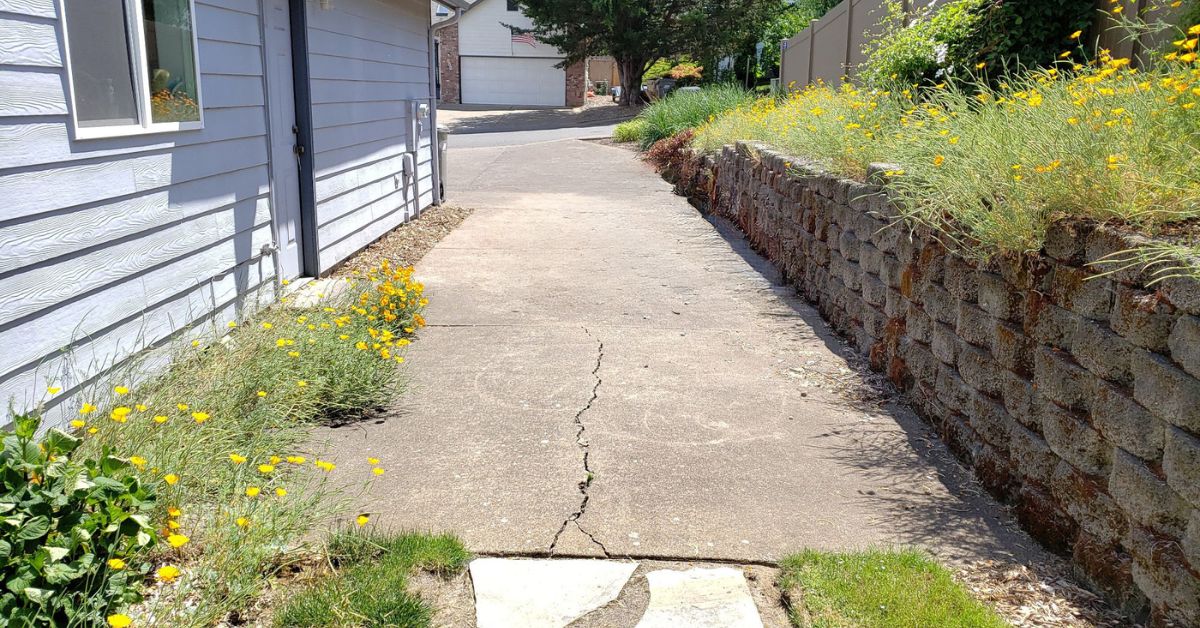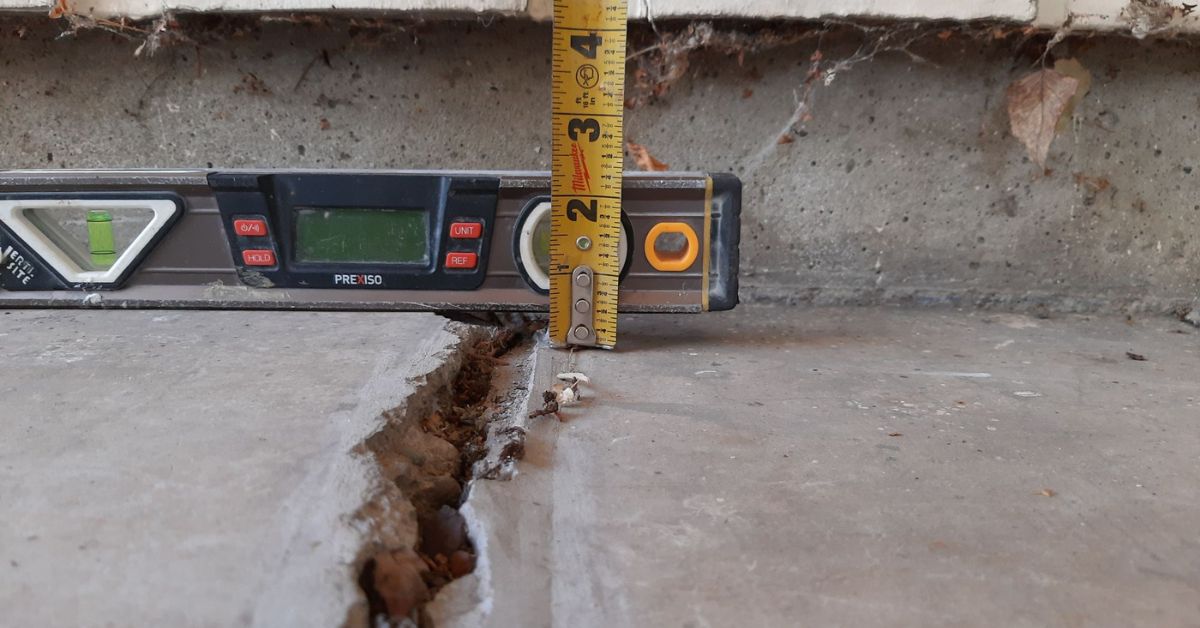Concrete slabs are foundational elements in and around your home, from driveways and patios to basement floors and walkways. While they are designed to last for decades, they are not immune to wear and tear caused by time, weather, and shifting ground. Uneven concrete is one of the most overlooked problems homeowners face because many see it as a cosmetic issue. However, it can have far-reaching implications if left unchecked.
Understanding the importance of diagnosing and repairing uneven concrete slabs is crucial for maintaining the safety, aesthetics, and value of your property. To help you know why that is, this post will walk you through the key things all homeowners should be aware of when it comes to concrete repairs.
Signs of Uneven Concrete in and Around the House
The most obvious sign of uneven concrete is the appearance of cracks, dips, or raised edges along concrete slabs. You’ll be most likely to spot these irregularities in places like your driveway, sidewalk, or patio. You might feel a bump underfoot or hear a loud thud when rolling a cart or bike wheel across the affected area.
Another telltale sign is water pooling on slabs after rainfall or hose use. Properly leveled concrete is designed to drain water away efficiently. However, a misaligned surface can create dips that trap water, further exacerbating structural issues.
Inside your home, uneven basement or garage floors can indicate deeper foundational issues. If you notice doors that drag along the floor, misaligned door frames, or furniture that won’t sit level, it’s essential to check whether the underlying concrete might be part of the problem. Over time, these signs will only get more pronounced unless addressed.

The Dangers of Neglecting Uneven Concrete
While it may be tempting to dismiss uneven concrete as a minor concern, ignoring the problem can lead to a cascade of hazards for both your home and its inhabitants. Safety is the most immediate concern. Uneven slabs create tripping hazards, especially for children, the elderly, and anyone with mobility challenges. A simple misstep can result in serious injuries.
Structural integrity is another area of concern. Once slabs begin to sink or crack, they become more vulnerable to weather extremes. Water can seep into cracks, causing additional erosion or damage during freeze-thaw cycles. This not only weakens the concrete itself but can also lead to soil shifts that impact your home’s foundation.
Financially, delaying repairs often means a more expensive fix in the long run. Small issues, such as surface cracks, can escalate into larger problems that might require full slab replacements. Regular inspection and immediate attention to uneven concrete can save you from significant repair or replacement costs down the line.
Finally, aesthetics matter. Uneven or damaged concrete detracts from the overall curb appeal of your home, potentially decreasing its value. This can be a red flag for potential buyers if you’re planning to sell, as they may see uneven slabs as a sign of neglect or underlying structural problems.
The Benefits of Repairing Uneven Concrete Slabs
Promptly addressing uneven concrete slabs that you need to repair brings a variety of benefits, beginning with enhanced safety. Leveling a cracked or misaligned surface eliminates tripping hazards, making your home safer for everyone.
Concrete repairs also contribute to the longevity of your property. By addressing issues early, you prevent further cracking and erosion, extending the life of your concrete structures. Functional improvements often accompany these repairs as well. Fixed surfaces properly channel water away from your home, reducing the risk of flooding or water damage.
Aesthetics and property value also see a boost. A smooth, visually appealing driveway or flawlessly leveled patio sends a message of care and attention to detail, which can be especially important when you’re hosting or preparing to sell your home.
Finally, repairs will save you money in the long term. Tackling a small, localized problem now is significantly more cost-effective than having to replace an entire slab—or worse, deal with costly foundation repairs caused by neglect.
Common Methods for Professional Repair of Uneven Concrete
Many homeowners assume that damaged concrete automatically requires complete replacement, but this is not always true. Professional contractors can assess the extent of the issue and determine if repair methods will suffice instead of starting from scratch.
One popular method is slab jacking (or mudjacking), which uses a specialized solution of sand, cement, and other materials and injects them beneath the uneven slab to flatten it out. It does this by raising the slab back to its original position, eliminating gaps caused by sinking or ground shifting. While it’s not the best solution, it’s a cost-effective one, ideal for mildly sunken slabs.
Another modern alternative is polyurethane foam leveling. Unlike the slurry used in slab jacking, polyurethane foam expands and hardens, quickly stabilizing and lifting the slab. This method offers more precision and durability than the previous option and is often recommended for areas like driveways or garage floors that experience heavier loads.
For surface-level damage like chips and cracks, epoxy and resin-based fillers can fill gaps and restore strength to structural concrete. These materials harden quickly, leaving a smooth finish and preventing further cracking.
Finally, in cases where structural damage runs too deep, full slab replacement might become a necessity. Though more expensive, replacement guarantees that your surface is secure, stable, and built to last. A reputable contractor will assess whether this level of intervention is required and explain your options.

Tips for Finding the Right Contractor for Concrete Repairs
A final thing to note is that hiring the right contractor to handle your uneven concrete repairs is as important as identifying the problem itself. Start by researching contractors in your area and reading reviews from previous clients. If you’re in Oregon, be sure to look into our Portland foundation contractors. They’re some of the best in the business. Still, be sure to look for companies or individuals with a strong track record of reliability, expertise, and customer satisfaction.
Ask potential contractors about their experience, specifically in concrete leveling or slab repairs. Don’t hesitate to request examples of completed projects or testimonials from satisfied homeowners. It’s essential to work with someone who understands the complexities of concrete surfaces and can recommend the most effective repair method for your situation.
Obtain multiple quotes to ensure pricing transparency. However, remember that the cheapest option is not always the best. A detailed written estimate should break down the costs of materials, labor, and any additional fees.
Finally, confirm that your contractor has all the proper licenses and insurance. These will protect you from costs associated with accidental damage or injury during the project. A professional contractor will readily provide these credentials and answer any questions you have about the process, ensuring you feel confident in their ability to complete the project to your satisfaction before hiring them.
